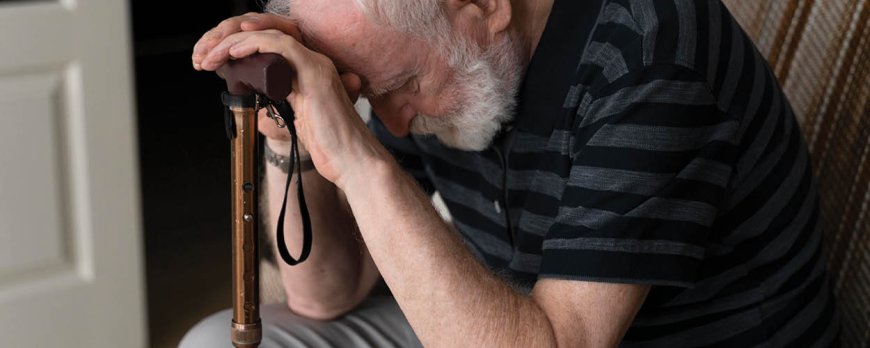How is anxiety diagnosed?
Learn how anxiety is diagnosed by mental health professionals. Get insights into the criteria, assessment methods, and the importance of a proper diagnosis.

How is anxiety diagnosed?
When it comes to anxiety, understanding how it is diagnosed is crucial in order to receive appropriate treatment and support. The process of diagnosing anxiety involves seeking help from healthcare professionals and undergoing an evaluation to receive a proper diagnosis.
Key Takeaways:
- Anxiety diagnosis starts with seeing a primary care provider who may check for underlying medical conditions.
- If anxiety is severe, a referral to a mental health specialist, such as a psychiatrist or psychologist, may be necessary.
- A psychological evaluation using the DSM-5 criteria is commonly used to assess symptoms and make a diagnosis.
- Treatment for anxiety disorders typically involves a combination of psychotherapy and medication.
- Psychotherapy, such as cognitive behavioral therapy (CBT), can help manage anxiety symptoms.
Seeking Initial Medical Evaluation
To begin the diagnostic process, it is recommended to consult with a primary care provider to assess your symptoms and rule out any medical causes of anxiety. Your primary care provider will discuss your symptoms with you in detail and may perform physical examinations or order diagnostic tests to help determine the underlying cause of your anxiety.
If your anxiety is severe or persists despite initial evaluation, your primary care provider may refer you to a mental health specialist, such as a psychiatrist or psychologist. These specialists are trained in diagnosing and treating mental health disorders and can provide a more comprehensive evaluation of your anxiety symptoms.
Medical Evaluation
During the medical evaluation, your healthcare provider may ask you questions about your medical history, any medications you are currently taking, and your family history of mental health disorders. They may also inquire about any recent stressors or traumatic experiences that could be contributing to your anxiety.
In some cases, your primary care provider may order additional diagnostic tests, such as blood tests or imaging scans, to rule out underlying medical conditions that could be causing your anxiety symptoms. These tests may help identify any hormonal imbalances, thyroid abnormalities, or other physical factors that could be contributing to your anxiety.
Remember, seeking help from a healthcare professional is the first step towards receiving an accurate diagnosis and starting an appropriate treatment plan to manage your anxiety symptoms effectively.

Referral to a Mental Health Specialist
If your anxiety persists or is severe, your primary care provider may refer you to a mental health specialist who can conduct a thorough assessment to determine an accurate diagnosis. These professionals, such as psychiatrists or psychologists, have expertise in evaluating and diagnosing anxiety disorders.
The assessment process usually begins with a comprehensive evaluation of your symptoms and medical history. The mental health specialist will ask you questions about your anxiety symptoms, their duration, intensity, and any triggering factors. They may also inquire about your personal and family history of mental health conditions.
Anxiety Assessment
During the assessment, the mental health specialist will use diagnostic tools to evaluate your anxiety symptoms against the criteria outlined in the Diagnostic and Statistical Manual of Mental Disorders (DSM-5). This manual provides a standardized set of criteria that professionals use to diagnose mental health conditions.
The specialist may also employ additional assessment techniques, such as screening questionnaires or structured interviews, to gain further insight into your condition. These assessments help the mental health specialist form a comprehensive understanding of your symptoms, which aids in making an accurate diagnosis.
It's important to be open and honest during the assessment process. Sharing your experiences and concerns will enable the mental health specialist to develop an individualized treatment plan tailored to your needs.

Psychological evaluation and criteria assessment
During the psychological evaluation, mental health professionals will assess your symptoms and compare them to the established diagnostic criteria outlined in the DSM-5. This comprehensive evaluation allows them to determine whether you meet the criteria for an anxiety disorder.
Through interviews and questionnaires, the mental health professional will collect information about your symptoms, the duration and intensity of those symptoms, and how they impact your daily life. They will also inquire about any potential underlying medical conditions, as some physical health issues can contribute to anxiety symptoms.
Once they have gathered all the necessary information, the mental health professional will carefully analyze your symptoms and compare them to the diagnostic criteria in the DSM-5. This manual provides a standardized framework that helps to ensure accurate and consistent diagnoses. It includes specific criteria that need to be met to receive a diagnosis of an anxiety disorder.
Examples of diagnostic criteria for anxiety disorders:
- Excessive worry or anxiety about multiple situations or events
- Feeling restless, on edge, or easily fatigued
- Difficulty concentrating or the mind going blank
- Irritability
- Sleep disturbances such as trouble falling asleep, staying asleep, or having restless and unsatisfying sleep
- Physical symptoms such as muscle tension, headaches, or stomachaches
By thoroughly assessing your symptoms and comparing them to the diagnostic criteria, mental health professionals can provide an accurate diagnosis and develop an appropriate treatment plan tailored to your specific needs.
Please note that self-diagnosis is not recommended, and it is important to consult with a qualified healthcare professional for an accurate diagnosis and treatment.
Treatment Options for Anxiety Disorders
Treatment for anxiety disorders typically involves a combination of psychotherapy and medication tailored to address the specific needs of the individual.
Psychotherapy:
- Cognitive Behavioral Therapy (CBT): CBT is a commonly used form of therapy that focuses on identifying and changing negative thought patterns and behaviors associated with anxiety. It helps individuals develop coping mechanisms and problem-solving skills to manage anxiety symptoms effectively.
- Exposure Therapy: This type of therapy involves gradually exposing individuals to situations or objects that trigger their anxiety in a controlled and supportive environment. The goal is to reduce fear and build resilience by gradually increasing exposure to anxiety-provoking stimuli.
- Acceptance and Commitment Therapy (ACT): ACT aims to help individuals accept their anxious thoughts and feelings rather than trying to eliminate them. It focuses on teaching mindfulness techniques and values-based action to improve overall well-being despite anxiety.
Medication:
- Antidepressants: Selective serotonin reuptake inhibitors (SSRIs) and serotonin-norepinephrine reuptake inhibitors (SNRIs) are commonly prescribed antidepressants used in the treatment of anxiety disorders. These medications work by increasing the levels of certain neurotransmitters in the brain to improve mood and reduce anxiety symptoms.
- Anti-Anxiety Medications: Benzodiazepines are a class of medications that may be prescribed for short-term relief of severe anxiety symptoms. However, they are typically used cautiously due to their potential for dependence and abuse.
Lifestyle Changes:
- Regular Exercise: Engaging in regular physical activity can help reduce anxiety symptoms by promoting the release of endorphins, which are natural mood boosters.
- Stress Management: Learning and practicing stress management techniques such as deep breathing exercises, meditation, and relaxation techniques can help individuals better cope with stressors that contribute to anxiety.
- Prioritizing Sleep: Establishing a consistent sleep routine and ensuring an adequate amount of quality sleep can significantly improve overall mental well-being and reduce anxiety symptoms.
- Maintaining a Healthy Diet: Eating a balanced diet that includes nutrient-rich foods can support overall physical and emotional well-being, which can have a positive impact on anxiety management.
Seeking professional help and adhering to a personalized treatment plan are crucial for effectively managing anxiety symptoms. It is essential to consult with a healthcare professional to determine the most appropriate and effective treatment approach for your individual needs.

Psychotherapy for managing anxiety symptoms
Psychotherapy, particularly cognitive behavioral therapy (CBT), is a widely used approach in managing anxiety symptoms and addressing the underlying causes of anxiety disorders. CBT focuses on changing negative thought patterns and behaviors that contribute to anxiety, helping individuals develop more effective coping strategies. Through collaboration between the therapist and the individual, CBT aims to identify and challenge irrational thoughts, provide practical tools for managing anxiety, and gradually expose individuals to feared situations to build resilience.
During CBT sessions, individuals may learn relaxation techniques, such as deep breathing exercises and progressive muscle relaxation, to help reduce physical symptoms of anxiety. The therapist may also guide individuals in identifying and reframing distorted thinking patterns that contribute to their anxiety, such as catastrophizing or overgeneralizing. By replacing negative thoughts with more realistic and positive ones, individuals can gradually reduce their anxiety levels and improve their overall well-being.
Benefits of cognitive behavioral therapy for anxiety management:
- Provides practical tools and strategies for managing anxiety in everyday life
- Helps individuals develop a better understanding of their anxiety triggers and patterns
- Promotes long-term changes in thought patterns and behaviors
- Targets the underlying causes of anxiety, leading to sustainable symptom relief
- Empowers individuals to take an active role in their treatment and recovery
It's important to note that CBT may not be suitable for everyone, and individual preferences and needs should be taken into consideration when choosing a treatment approach. Some individuals may benefit from other forms of therapy, such as exposure therapy or acceptance and commitment therapy. It's essential to consult with a mental health professional who can assess your specific needs and tailor a treatment plan that best suits you.
Remember, seeking professional help and adhering to a treatment plan are crucial steps in effectively managing anxiety symptoms. With the right support and strategies, individuals can learn to better cope with anxiety and lead fulfilling lives.
Medication in the Treatment of Anxiety Disorders
In some cases, medication, such as antidepressants or anti-anxiety medications, may be prescribed to assist in managing anxiety symptoms and promoting overall well-being. These medications work by altering the chemicals in the brain that regulate mood and emotions, helping to reduce feelings of anxiety and improve quality of life.
Antidepressants are commonly used to treat anxiety disorders. Selective serotonin reuptake inhibitors (SSRIs) and serotonin-norepinephrine reuptake inhibitors (SNRIs) are two types of antidepressants often prescribed for anxiety. They work by increasing the levels of serotonin and norepinephrine in the brain, which can help regulate mood and reduce anxiety symptoms.
Anti-anxiety medications, also known as benzodiazepines, are another option for managing acute anxiety symptoms. These medications work by enhancing the effects of a neurotransmitter called gamma-aminobutyric acid (GABA), which has a calming effect on the brain. While benzodiazepines can provide short-term relief, they are typically used cautiously due to the risk of dependence and potential side effects.
Considerations when Prescribing Medication
When prescribing medication for anxiety disorders, healthcare professionals take into account several factors. These include the severity of symptoms, the individual's overall health, any potential drug interactions, and the risk of side effects. It is important to have open and honest communication with your healthcare provider to ensure that the prescribed medication is appropriate for your specific needs and circumstances.
It is also important to note that medication should not be seen as the sole solution for managing anxiety. It is often used in conjunction with psychotherapy, such as cognitive-behavioral therapy (CBT), to provide a comprehensive approach to treatment. CBT can help individuals learn coping strategies, identify and challenge negative thought patterns, and develop healthier ways of managing anxiety in their daily lives.
Overall, the use of medication in the treatment of anxiety disorders is a decision that should be made in consultation with a healthcare professional. They can assess your symptoms, discuss the potential benefits and risks of medication, and work with you to develop an individualized treatment plan that addresses your unique needs and goals.

Lifestyle Changes for Managing Anxiety
Making positive lifestyle changes, such as engaging in regular exercise and managing stress, plays a crucial role in managing anxiety symptoms and promoting overall mental well-being. These changes are not meant to replace professional treatment but can enhance its effectiveness. Here are some lifestyle modifications that can help individuals cope with anxiety:
- Regular exercise: Engaging in physical activity on a regular basis can reduce anxiety symptoms by releasing endorphins, which are natural mood-boosting chemicals in the brain. Aim for at least 30 minutes of moderate-intensity exercise, such as brisk walking or swimming, most days of the week.
- Stress management techniques: Learning and practicing stress management techniques, such as deep breathing exercises, meditation, and mindfulness, can help individuals better control their anxiety levels. These techniques promote relaxation and help to calm the mind.
- Proper sleep: Getting enough restful sleep is essential for managing anxiety. Establishing a regular sleep routine, creating a comfortable sleep environment, and avoiding stimulants like caffeine before bedtime can contribute to improved sleep quality.
- Healthy diet: Consuming a balanced diet rich in fruits, vegetables, whole grains, and lean proteins can support overall mental well-being. Avoiding excessive consumption of caffeine, alcohol, and processed foods is also beneficial.
It's important to note that the effectiveness of lifestyle changes may vary from person to person. What works for one individual may not work for another. Therefore, it's essential to find a combination of strategies that best suit your needs and consult with a healthcare professional for personalized guidance and support.
Conclusion
Obtaining a proper diagnosis of anxiety is essential for individuals to receive appropriate treatment and support, enabling them to manage their symptoms and improve their quality of life. To diagnose anxiety, it is recommended to start by seeing a primary care provider who can assess your symptoms and check for any underlying medical conditions that may contribute to anxiety.
If your anxiety is severe or persistent, your primary care provider may refer you to a mental health specialist, such as a psychiatrist or psychologist. These professionals can conduct a comprehensive psychological evaluation, comparing your symptoms to the criteria outlined in the Diagnostic and Statistical Manual of Mental Disorders (DSM-5), which is widely used for diagnosing mental health conditions.
Treatment for anxiety disorders typically involves a combination of psychotherapy and medication. Psychotherapy, such as cognitive behavioral therapy (CBT), can be highly effective in managing anxiety symptoms by helping individuals develop coping strategies and change negative thought patterns. Medications, such as antidepressants or anti-anxiety medications, may also be prescribed in some cases to alleviate symptoms and provide additional support.
In addition to professional treatment, making lifestyle changes can also play a crucial role in managing anxiety. Engaging in regular exercise, avoiding alcohol and recreational drugs, managing stress through relaxation techniques, prioritizing sleep, and maintaining a healthy diet can all contribute to a well-rounded approach to anxiety management.
Remember, seeking professional help and sticking to your treatment plan is essential in effectively managing anxiety symptoms. By obtaining a proper diagnosis and following through with recommended therapies and lifestyle changes, individuals can gain control over their anxiety, improve their overall well-being, and lead a fulfilling life.
FAQ
Q: How is anxiety diagnosed?
A: Anxiety can be diagnosed by healthcare professionals through a combination of medical evaluation and psychological assessment.
Q: What is the first step in diagnosing anxiety?
A: The initial step is to seek a medical evaluation with a primary care provider, who can check for any underlying medical conditions that may contribute to anxiety symptoms.
Q: When should I see a mental health specialist for anxiety?
A: If your anxiety is severe or persists despite initial evaluation, you may be referred to a mental health specialist, such as a psychiatrist or psychologist, for a comprehensive assessment.
Q: How do mental health specialists diagnose anxiety?
A: Mental health specialists use a psychological evaluation to assess anxiety symptoms and compare them to the criteria in the Diagnostic and Statistical Manual of Mental Disorders (DSM-5) to make a diagnosis.
Q: What are the treatment options for anxiety disorders?
A: Treatment for anxiety disorders typically involves a combination of psychotherapy and medication. Psychotherapy, such as cognitive behavioral therapy (CBT), helps in managing anxiety symptoms, while medications like antidepressants or anti-anxiety medications may be prescribed in some cases.
Q: How does psychotherapy help in managing anxiety symptoms?
A: Psychotherapy, specifically cognitive behavioral therapy (CBT), provides techniques and strategies to help individuals cope with and overcome anxiety. It targets negative thought patterns and behaviors associated with anxiety.
Q: Are medications used in the treatment of anxiety disorders?
A: Yes, medications like antidepressants and anti-anxiety medications may be prescribed for anxiety disorders. They can help alleviate symptoms and support the overall treatment plan.
Q: Can lifestyle changes help in managing anxiety?
A: Yes, lifestyle changes play a significant role in managing anxiety. Engaging in regular exercise, avoiding alcohol and recreational drugs, managing stress, prioritizing sleep, and eating a healthy diet can all contribute to effective anxiety management.
Q: What is the importance of a proper diagnosis for anxiety?
A: A proper diagnosis is crucial in determining the most appropriate treatment plan for anxiety. Seeking professional help and following the treatment plan can lead to effective symptom management and improved quality of life.


































































































































